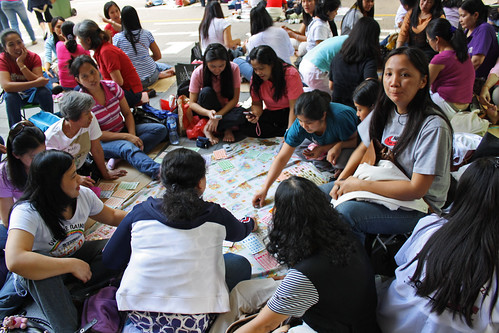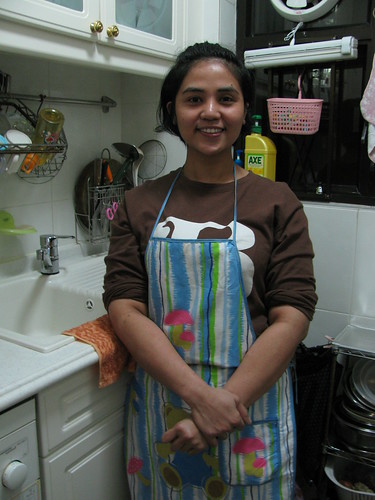In the Xin Yi district of Taipei, home to the famous 101 skyscaper, immaculate residential mid-rises owned by the powerful and rich Taipei elite sit quietly amidst the buzz of one of the busiest intersections in the city. At any given time, one can catch a glimpse of young adult females in the windows of these flats and penthouses, cleaning and then re-cleaning windows, walking dogs, rearing children of their employers, cooking and serving food, and generally leading the life of an indentured servant.
It is rare to see a housekeeper taking a walk, or out relaxing and enjoying the day. Even rarer still is it to see one doing anything but working within the confines of the household in which she is employed.
In late November of this year, multiple news outlets reported the charging of Taiwanese director-general of the Taipei Economic and Cultural Office in Kansas City, Jacqueline Liu (劉姍姍), for the mistreatment of her Filipina housekeepers. She reportedly plead guilty to charges of overworking, underpaying, and mistreating her housekeepers, which was in violation of their employment contracts.
Liu was forced to pay said housekeepers over USD $80,000 in restitution for forcing them to work 16-18-hour days 6 ½ days per week. The housekeepers were found to have been victims of what is considered a severe human trafficking case under the Trafficking Victims Protection Act. They will be issued visas and allowed to remain in the U.S. for the purpose of finding work. As for Lui, she will be detained in prison until her sentencing, though she maintains that she does not feel she did anything wrong.
As a previous resident of Taipei, I can understand why Lui feels that she acted lawfully – as it pertains to how things are done in Taiwan, at least. It is a common practice to overwork and underpay migrant house workers, who are usually young women from the Philippines or Indonesia.
Under Taiwanese law, blue collar migrant workers enter into a contract with their employers and cannot freely change employers without being in violation of said contract and thereby risking deportation. Therefore, migrant workers are under pressure to please their employers, many of whom impose arbitrary pay cuts and require ridiculously long hours of overtime, and often do not give their employees holidays off.
As a foreigner in Taiwan, it seemed like a pretty special treat to be able to hire a housekeeper to stop by our flat and only charge about $200-$300 NT per hour (about USD$6-$10) for cleaning services (which, by the way, is much much higher than a normal contractual wage in Taipei for a full-time housekeeper). This was a great deal cheaper than anything I could have found in the states.
Though I never employed a housekeeper myself, I did pay my downstairs neighbor’s housekeeper, Nana, a little bit of extra money to handle garbage duties for me (which is a real pain in Taiwan).
Given that I was usually home when she stopped by, I used to ask her about her day, which eventually turned into talking about her life and her family back home. She was from Indonesia and had lived in Taipei for nearly five years. She was married and had come abroad in order to make enough money to return home and build a house with her husband, who worked at a factory in South Korea. Even though the money she made seemed like peanuts compared to what I made as an English tutor, it was more than she could have hoped to make in a lifetime in Indonesia where she was from. In order to provide for her family, she felt compelled work in Taiwan, sending every penny of her earnings back home each pay period and never buying anything for herself.
It had been five years since she had seen her husband or any members of her family. This broke my heart.
Nana’s story is not uncommon in Taipei. Migrant workers just like her leave their families at home in order to make enough money to provide them with a better life in the future. Many of these women even leave young children behind, and end up serving as nannies for the children of their employers – something I can imagine must be extremely emotionally difficult.
Over time, Nana and I developed some semblance of a friendship. She confided to me that she had originally been brought to Taiwan by a family other than the one she was currently employed by. She had fled after being verbally and sometimes physically abused by her former employer. Though she now worked almost every waking moment, she liked this new employer who allowed her to use her limited free time to make extra money on the side, and gave her small bonuses during the holidays.
However, she lived in fear of deportation nearly every day. She almost never left the building, save for the rare occasions when she took the risk of leaving the flat in order to wire her earnings back home.
This was a risky situation, as the employer also ran the risk of being fined for employing her as an undocumented worker. I suppose by extension, I was running the same risk by paying her to help with the trash.
She would eventually head home when the time was right. She would tell the airport officials that she didn’t have the money to pay the fine for overstaying her visa – a crime punishable by being barred from ever returning to Taipei. This would work out just fine for her, as she had no plans of returning, anyway.
Her situation was such a stark juxtaposition to that of my English-teaching peers, though they were both technically migrant workers. Both parties had come to Taiwan in hopes of making some cash in order to have a better life. English speakers could make a great living as English teachers, able to get pretty good hourly wages in schools and bushibans (English cram-schools) with the ability to put plenty away for travel and savings. The funny thing is most of the housekeepers from the Philippines were native English-speakers as well, but would never have been given the chance to teach. They were simply from the wrong region of the world to have a shot at that opportunity.
When I was getting ready to return home, Nana cried and insisted on helping me pack. It was an unlikely friendship that really put a face to cheap labor that was so distant from me previously. It was something I had only read about, but now had seen first-hand for myself. When it comes down to it, Nana chose to come to Taiwan because she wanted a chance to make money to support her family. I wonder if she still would have come had she known how difficult it was going to be, which is something I never got a chance to ask her.
I hope that now, she’s back with her husband in Indonesia, living in a house she built with her earnings, rearing a family, most likely with local maids of her own.

Ava Apollo grew up in Southern California where she was exposed to a wide variety of languages and cultures. After her university years, Ava spent a year in Taipei where her love of travel, Chinese language, and writing were intensified.
Ava has since returned to California, however, she remains a lover of writing about Asia and traveling the world. When she’s not writing for MSW, Ava’s blogging about love and life along with her friends Stella Sage and Bella Blue on Super Blogettes.












